|
|
|
Sort Order |
|
|
|
Items / Page
|
|
|
|
|
|
|
| Srl | Item |
| 1 |
ID:
110770


|
|
|
|
|
| Publication |
2011.
|
| Summary/Abstract |
This article assesses the extent to which security regimes are the products of authorization in the thought of Thomas Hobbes and Carl Schmitt. The Hobbesian security regime offers a contingent construction of security in terms of processes of authorization and brings into view questions about the epistemic construction of security within security discourse today. The Schmittian concept of security involves the naturalization of security through the state, meaning that security is understood as condition rather than regime. Rather than look to Carl Schmitt's concept of security as the paradigm of international security today, there are clear benefits in returning to the contractual account of security evident in the Hobbesian emphasis on authorization. Security is not the primary value of political community, but the means by which political communities realize their internal goods. Schmitt's security regime is fictive, driven by colourful metaphor and political theology. By returning to classic questions of authorization-how a security regime authorizes itself-International Relations theory can examine the legitimation of security beyond an exclusively state-centric model.
|
|
|
|
|
|
|
|
|
|
|
|
|
|
|
|
| 2 |
ID:
101843
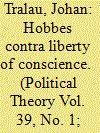

|
|
|
|
|
| Publication |
2011.
|
| Summary/Abstract |
It has often been argued that, notwithstanding his commitment to the authoritarian state, Thomas Hobbes is a champion of the "minimal" version of liberty of conscience: namely, the freedom of citizens to think whatever they like as long as they obey the law. Such an interpretation renders Hobbes's philosophy more palatable to contemporary society. Yet the claim is incorrect. Alongside his notion of "private" conscience, namely, Hobbes develops a conception of conscience as a public phenomenon. In the following, it is argued that this inconsistency serves the purpose of deception: it holds out the possibility of dissent while making it impossible to utilise. Arguably, moreover, this is the proper hermeneutical approach to take to Hobbes's inconsistencies in general. Indeed, said inconsistencies ought to alert contemporary normative theorists to the instability of the "minimal" version of liberty of conscience attributed to Hobbes: Hobbes himself, namely, shows that it is insufficient.
|
|
|
|
|
|
|
|
|
|
|
|
|
|
|
|
| 3 |
ID:
178692
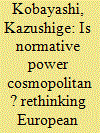

|
|
|
|
|
| Summary/Abstract |
Despite the apparent consensus that European Union (EU) normative power embodies a Kantian cosmopolitan approach to world politics, such a consensus is typically presupposed by scholars, rather than being critically examined by them. By offering macro-historical reflections, this article argues that EU normative power deviates from the Kantian cosmopolitan ideal and in fact replicates the Hobbesian logic of normative homogenization. Renouncing the medieval Vatican’s ambition to construct a united Europe anchored in uniform normativity, Kantian theory celebrates multiple normalcy as the basis for human freedom, perpetual peace, and mutual transformation. In contrast, Hobbesian theory is driven by the conviction that a peaceful value-based community could be built only through normative homogenization, behavioural conformism, and moral unity. In Hobbesian theory, the Leviathan exercises a transformative power to socialize others, eliminate discords, and build a commonwealth through norm diffusion and public education. In this vein, the EU’s aspiration to build a normatively homogenous Europe seems to reflect Hobbes’s vision of normative unity, rather than Kant’s vision of cosmopolitan diversity. Should the EU aspire to pursue a cosmopolitan foreign policy, it needs to pay more attention to the power-political implications of its drive toward normative homogenization and shift its focus from socialization to mutual transformation.
|
|
|
|
|
|
|
|
|
|
|
|
|
|
|
|
| 4 |
ID:
092035
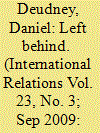

|
|
|
|
|
| Publication |
2009.
|
| Summary/Abstract |
Anarchy and the balance of power are the two core ideas in Waltz's neorealism, and he explicitly draws them from early modern political theory, particularly Hobbes and Rousseau. Unfortunately, Waltz leaves behind a key variable in these early modern state-of-nature arguments: violence interdependence - the capacity of actors to harm one another (independent of distribution of power). This difference between the extreme insecurity of the state of nature and the tractable insecurity of the state of war derives from different degrees of violence interdependence. The variable is implicit but powerful in Hobbes, and explicit in Rousseau's analysis of topographic fragmentation as a foundation for the European state system. As the effects of the industrial revolution made themselves felt, many theorists (the global geopoliticans, Carr and many liberals) continued to employ the variable Waltz dropped, and they generally argued that Europe had shifted from a state-of-war to a state-of-nature anarchy, thus posing the choice of catastrophe or integration. Herz and Morgenthau continue this argument in the nuclear era, reaching very different conclusions than Waltz. Similarly, the balance of power was conceived by early modern republican theorists as the counter to hierarchy, and this was transposed to the 'system level' via the device of referring to Europe as a whole as a 'republic' that was in part 'by nature'. Other important republican power restraints (notably division, mixture and union) were dropped by Waltz but are developed by liberal globalist security theory.
|
|
|
|
|
|
|
|
|
|
|
|
|
|
|
|
| 5 |
ID:
157099
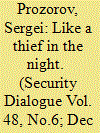

|
|
|
|
|
| Summary/Abstract |
The article addresses the reinterpretation of the problematic of security in the messianic turn in contemporary continental political thought. I focus on Giorgio Agamben’s reinterpretation of Hobbes’s Leviathan in Stasis, which restores an eschatological dimension to this foundational text of modern security politics. Hobbes’s commonwealth has been traditionally read as a secularized version of the katechon, a force that restrains the state of nature while drawing on its resources. Instead, Agamben argues that for Hobbes, the state is neither the analogue of God’s kingdom on earth nor the katechon that delays its arrival, but the profane power that will disappear when the kingdom of God is established on earth. It is thus in principle incapable of attaining the peace and security that it claims to provide, perpetually producing insecurity and violence in the guise of protection. In Agamben’s reading, it is precisely this failure of the state’s security apparatuses that assists the advent of the messianic event in an oblique fashion. The exposure of this failure does not aspire to the improvement of the apparatuses of security or resign us to inescapable insecurity but only affirms the need to render the present apparatuses inoperative, bringing forth a future without them.
|
|
|
|
|
|
|
|
|
|
|
|
|
|
|
|
| 6 |
ID:
184152
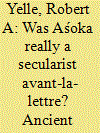

|
|
|
|
|
| Summary/Abstract |
Focusing on Rajeev Bhargava's claim that Aśoka was a secularist avant-la-lettre, I dispute the common understanding of secularism as the separation of religion and politics, and argue instead that such separation, to the extent that it existed, was characteristic of traditional religious societies. I then offer an alternative history of secularism as the demise of the traditional balance of power between church and state, and the rise of a unitary state which incorporated a civil religion that excluded competing forms of religiosity within its domain. This model of secularism, exemplified by the seventeenth-century English philosopher Thomas Hobbes, fits Aśoka's Dhamma better than the separationist model does.
|
|
|
|
|
|
|
|
|
|
|
|
|
|
|
|
|
|
|
|
|